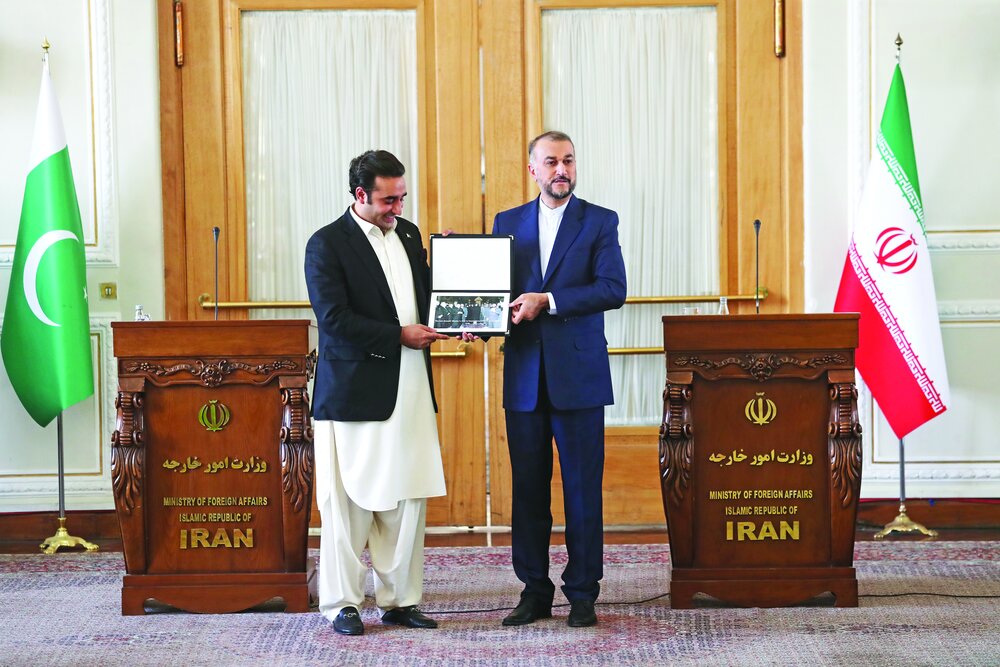U.S. indecision puts Vienna talks at jeopardy

TEHRAN — Pakistan’s Foreign Minister Bilawal Bhutto Zardari met with his Iranian counterpart Hossein Amir Abdollahian in Tehran on Tuesday.
Zardari, who is in Tehran for a two-day visit, met with President Ebrahim Raisi as well.
After their bilateral meeting, the two foreign ministers participated in a joint press conference.
Expressing satisfaction with the presence of his Pakistani counterpart in Tehran, Amir Abdollahian said, “The deep-rooted relations between the Islamic Republic of Iran and the Islamic Republic of Pakistan, two great countries in the Islamic world, have been full of hopeful moments over the past 75 years.”
He added that Raisi’s administration has established relations in the direction of developing more cooperation.
“I am proud to be the first Foreign Minister who traveled to Pakistan in the new era and recent political developments inside Pakistan and congratulated my good colleague, Mr. Zardari, better known in our country as Mr. Bhutto,” he noted.
Iran never escapes negotiation table
Elsewhere in the presser, the Iranian foreign minister also referred to the recent resolution issued by the IAEA Board of Governors, saying, “Another issue that was on our joint agenda in today's talks is how the Islamic Republic of Iran will react to the resolution issued by the International Atomic Energy Agency and whether to stop the ongoing process of negotiations in Vienna.”
Amir Abdollahian stated that Iran has never escaped from the negotiation table.
“We believe that negotiation and diplomacy are the best way to reach the end point of the agreement. We have taken important steps in recent months in the negotiations that my colleague Mr. Bagheri (Kani) had with Mr. Enrique Mora and the 4+1 countries in Vienna, as well as in the exchange of messages that took place between Iran and the United States during this period,” he noted.
The foreign minister reiterated his long-held position that Iran is seeking a “good, strong and stable agreement”.
He went on to say that in recent days, particularly last week, despite the continued exchange of indirect messages between Tehran and Washington and despite the progress that was made in the course of talks, all of a sudden, the American side submitted a resolution to the IAEA Board of Governors to put political pressure on Iran and to gain more concessions.
“Despite the fact that the American side informed us that this resolution was hollow, the very spirit of (issuing) the resolution made us warn the American side in doing so,” Amir Abdollahian noted.
He went on to inform the press that in the past days and prior to the issuance of the IAEA board’s resolution, Iran put forward yet another initiative, which was accepted by the United States.
“We put a new political package and a new initiative on the table, the American side accepted the initiative, but insisted on passing the resolution. As a result, we carried out these (reciprocal nuclear) measures by increasing our nuclear activities in areas that were announced, and implemented them through the Atomic Energy Organization (of Iran). These measures were officially noted to the Secretariat of the International Atomic Energy Agency before the resolution was issued,” he elaborated.
Amir Abdollahian stated that in response to the resolution Iran started to increase its nuclear activities. However, he underscored that Tehran will not run away from dialogue and negotiation.
“The Islamic Republic of Iran will not deviate from the logic of diplomacy and the logic of negotiations to reach a good, strong and lasting agreement,” he reiterated.
Indecision and lack of a will to seal a deal in Vienna coupled with the United States’ major dependence on its close allies have led to a never-ending pause in the Vienna talks.
This indecision may be rooted in Biden’s change of tactics to keep close to its West Asian allies, e.g. the Israeli regime and Saudi Arabia.
Once called the Saudi Kingdom a “pariah”, Biden has now changed his strategy by planning a visit to Riyadh next month.
“The President looks forward to outlining his affirmative vision for U.S. engagement in the region over the coming months and years,” White House press secretary Karine Jean-Pierre said in a statement, announcing the visit.
Remember there was a time when Biden said he won’t have talks with Mohammad bin Salman whom he directly holds responsible for Jamal Khashoggi’s brutal murder. Well now, all that has turned into some positive diplomatic mumbo-jumbo.
“The President appreciates King Salman's leadership and his invitation. He looks forward to this important visit to Saudi Arabia, which has been a strategic partner of the United States for nearly eight decades,” the new White House press secretary said.
Biden must choose. Either he wants to seal the deal in Vienna, or he wants to keep his friends happy.
You can’t have your cake and eat it too.
Leave a Comment